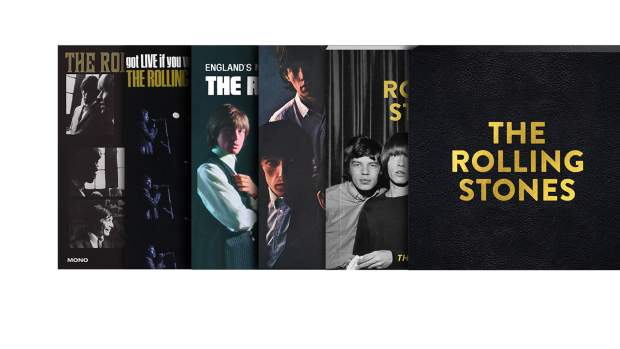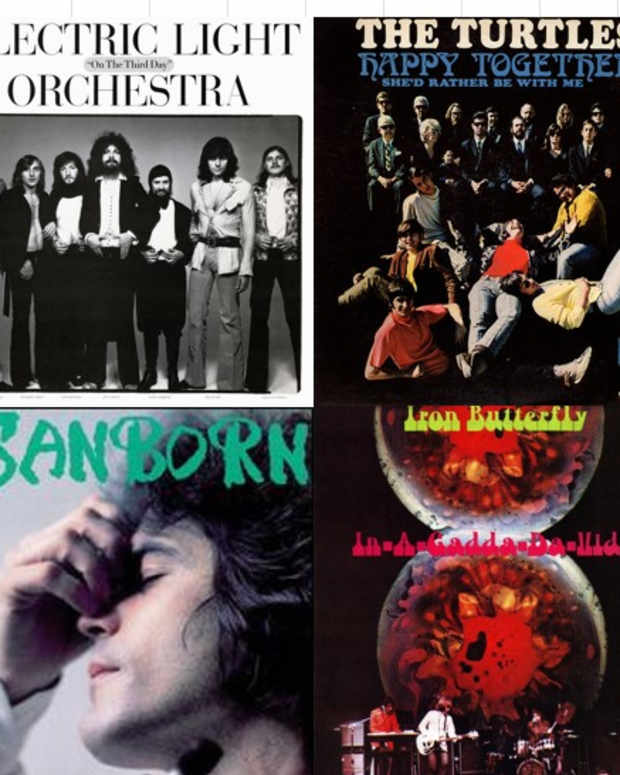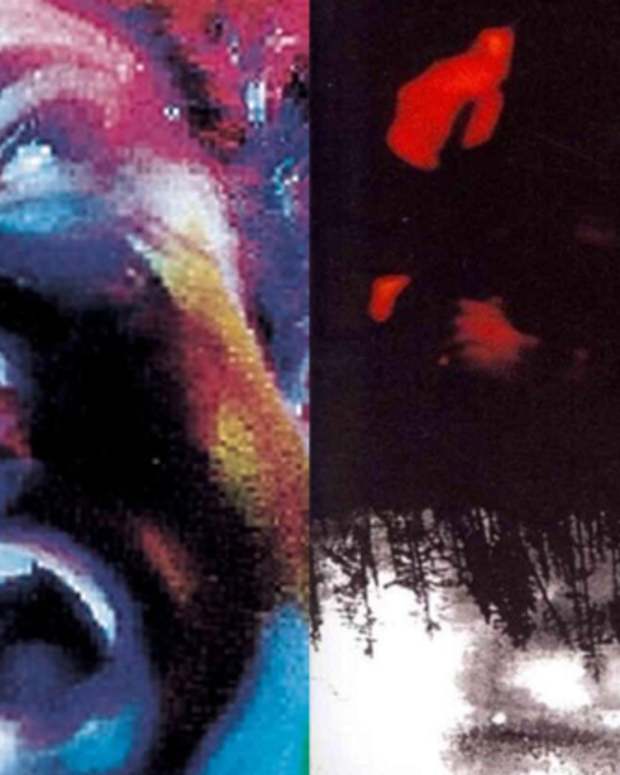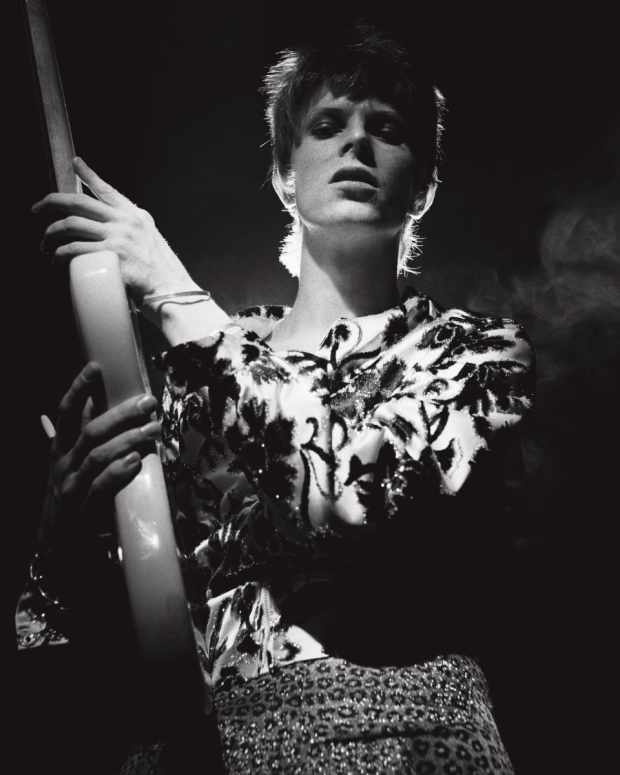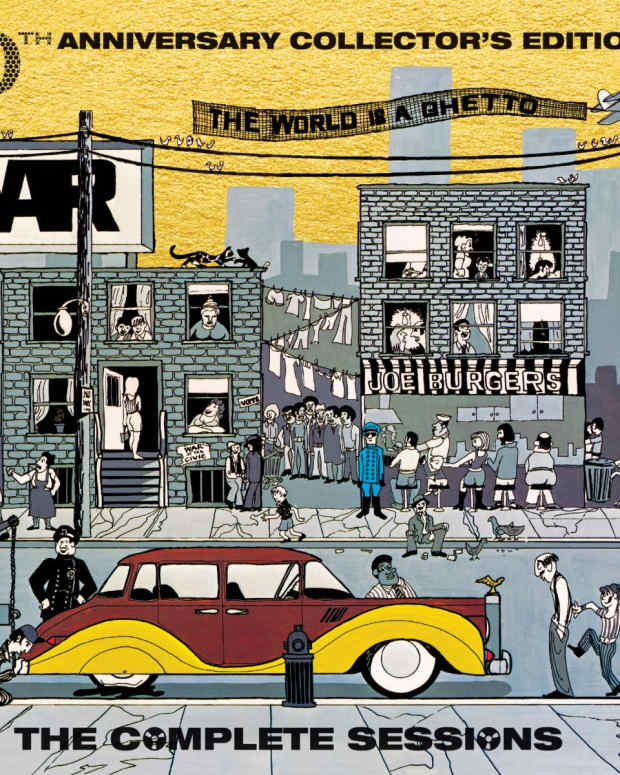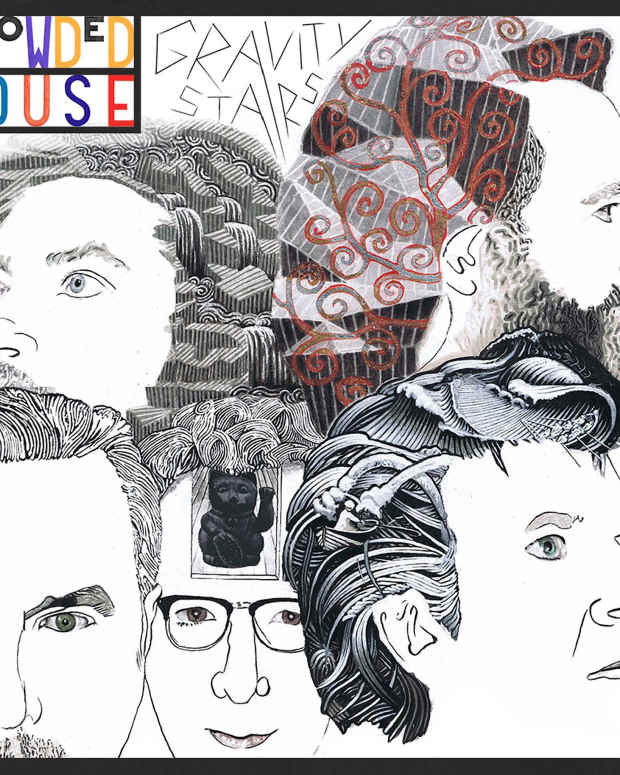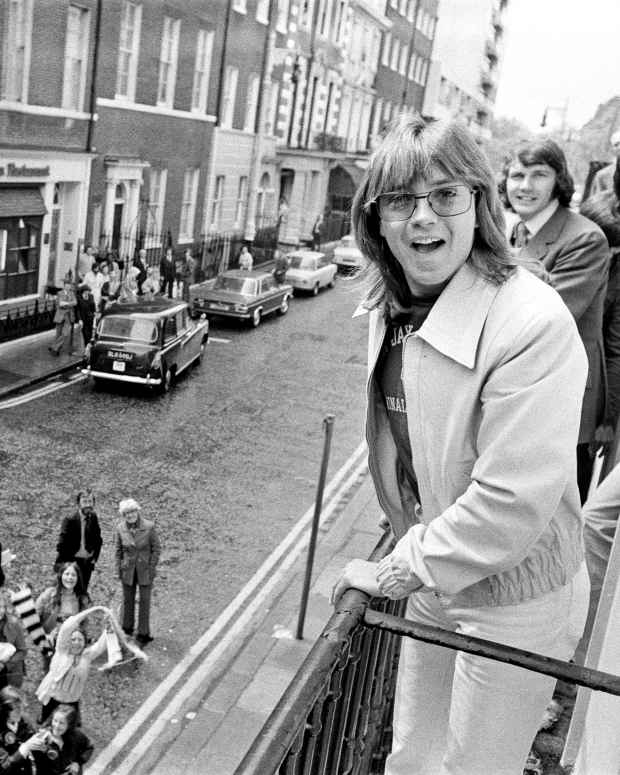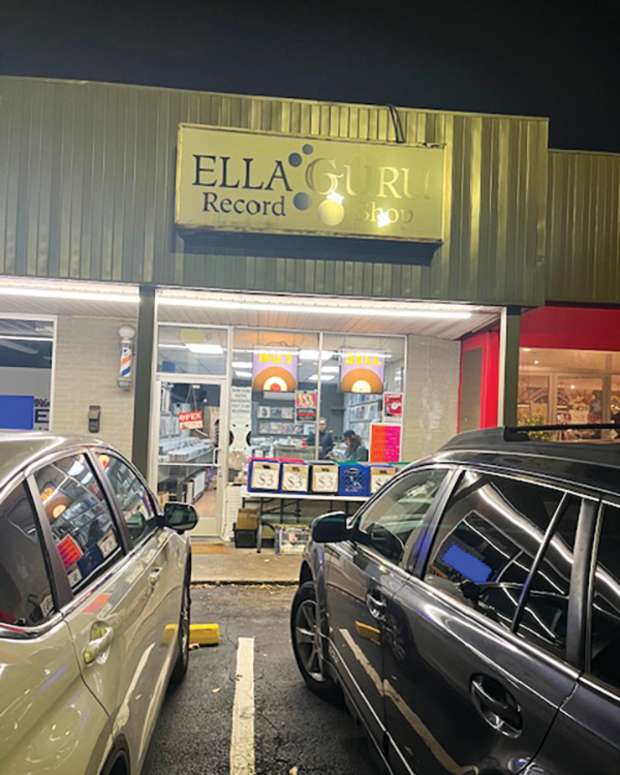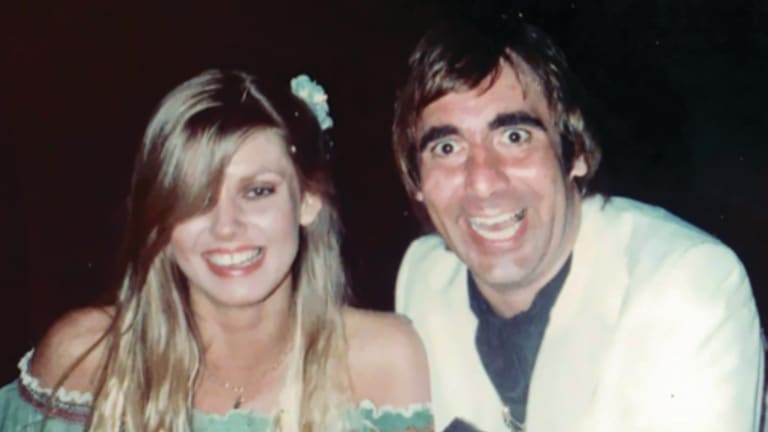
The last years of Keith Moon's life explained
Get vinyl, box sets and collectibles of The Who in the Goldmine shop
By Ken Sharp
The Who’s Keith Moon is routinely championed as one of music’s most explosive and creative drummers. His exploits away from the drum kit are legendary, too, whether bribing a stagehand to add more dynamite for a surprise explosion of his drum set at the end of The Who’s 1967 performance on The Smothers Brothers Show to earning a master’s degree in wrecking hotel rooms and destroying drum kits, the legend of Moon endures. But admiring “Moon The Loon” from a safe distance perched in your seat during a Who concert is one thing, living with him 24 hours a day was its own uniquely challenging experience. Annette Walter-Lax was Keith Moon’s girlfriend for the last four years of his life, spending wild times with him in Los Angeles and London and was with him the night he tragically died of an accidental overdose. Her book, The Last Four Years: A Rock Noir Romance, in conversation with Spencer Brown, is an intimate and illuminating look at the man behind the myth and presents an insightful and occasionally somber portrait of one of music’s most extraordinarily talented and colorful personalities.
GOLDMINE: You were Keith Moon’s girlfriend for the last four years of his life, hence the title of your book The Last Four Years. What was best and worst things about having Keith Moon as your boyfriend?
ANNETTE WALTER-LAX: The best thing about having Keith as a boyfriend was that he took me for an experience in my life that I had never thought in a million years was going to happen to me. He was funny, he was witty, and he was the type of boyfriend I could be with at that age myself. So, he really happened to me in the right time for me because I came to London looking for adventure, and I got it; boy, did I get it!
So, yeah, the worst thing about being his girlfriend was, I suppose, the dark side that he had. And had I known then what we know now about the issues of the mental illnesses, the diagnoses and things, I probably would have had a different approach to the whole thing. But I thought it was all down to drugs and alcohol and the fact that he was a rock star and that he was going to get better and all. And four years went by very quickly.
GM: Was there such a thing as a typical day in the life for Keith Moon?
AWL: No, (laughs) not a typical day. I mean, you have read the book, so you know that our holidays were lovely, he could really relax during these holidays where he went swimming, diving, relaxing; he wasn’t drunk, I mean, amazingly enough, he could stop drinking during these periods, holidays, and it was when he came back to the work, The Who, rock, his rock star status, that seemed to be a problem for him.
A typical day apart from the holidays with Keith would just be unpredictable. He could wake up, have breakfast, looking for alcohol, drugs and just start to go off on one of his benders, you know… no, I can’t say there was such a typical day, he changed from day to day, he could be funny, he could be fun to be with one day and the next day, he could be something totally different.
GM: Do you think he felt the pressure to always be “on”?
AWL: I think that was part of it. Yes, I do. I think it is an enormous stress involved of being a musician, rock star, not everybody can handle it. It’s a lot of pressure, and you have to be very sort of… to be able to shut certain things off, and still maintain that status. It was very, very hard for him. He felt that need to always oblige to make people happy, try and be funny, always be there, never let the audience down, so there was an enormous pressure, yes.
GM: What was Keith like, beyond the holidays, where he wasn’t “on”?
AWL: He was very quiet, he usually just stayed in bed, watching television, reading books. He loved sci-fi books. We watched all the old television shows back in Los Angeles, you know, a lot of black and white films and TV series. He didn’t want to answer the telephone, and he didn’t want to answer the door. Just cooking his dinners, and he was quite good at it. He made me some beautiful roasts. He cooked and we ate those, we ate in bed. We sort of lived in bed on his good days, sober days. And so, he was just normal. I mean, we had quite a few cats, and he loved those cats, so he would have those in bed with us as well. And yeah, those were the moments that I was aiming for him to always be like that. I actually thought that was going to happen. So he was sort of not very sociable. When he had a sober two or three days, he didn’t go out. He just stayed in the bedroom. We had a little kitchenette in the bedroom so we sort of just stayed there hiding…
GM: Away from music, what do you think were his main passions in life?
AWL: Well, he was into acting. This was part of him wanting to go to Los Angeles from the beginning and wanting to pursue an acting career. And he was trying hard to get involved with that, get involved with people, producers, directors and so forth and, of course, being Keith Moon. He met the right people as well. I mean, he had all the opportunities, really. His problem was of course, staying sober. So, it didn’t work out very well for him because he showed up drunk to auditions with some — Sam Peckinpah, for instance. Well, that was unfortunate that he had that problem. But his passion was to become an actor.
GM: Keith was a fan favorite and seemed to revel in his identity as a rock star. How were Keith’s interactions when meeting with his fans?
AWL: Well, I mean, he was very polite. He was an English-mannered, polite person; you know, he was nice to his fans. It is hard to say what he was like actually because I mean we had lots of wild parties in Los Angeles and there was sort of a mixture of fans and groupies, of course, and other stars in Hollywood. If somebody told him that they liked The Who, they liked him, and that they were fans of The Who, he was just honored. I mean, he just got chuffed and happy about it. He was proud of all that.
GM: In your book, you state that there was so many Keiths. What was the Keith that you would see the most?
AWL: The Keith that was putting on an act, that was trying too hard, that sometimes was confused, didn’t really know how to come across, to put himself out. Insecure, I think he was very insecure, trying to put on these different acts, dressing up and becoming other personalities and things, and what was going on inside him was so much.
GM: Keith is considered one of the most talented rock drummers of all time, do you think he knew how good he was?
AWL: Well, he knew he was ranked and rated the best drummer, but the thing is it was so easy for him, it was such a natural talent for him to do this. So, for him it was probably kind of strange for him really, because this came so natural for him. It is like a question he got at one point, I think somebody asked him, “What kind of drumming style do you have?” He said, “Well, I’ve got the Keith Moon style of drumming” (laughs), and that’s pretty much the way he was thinking about his drumming. But I mean, he had impeccable timing and he had the ear to follow and I think, him and Pete (Townshend) were so in sync. He must have known he was good, of course. Like I said, it came so easy to him.
GM: In your current profession as a psychotherapist, with your background looking at him as objectively as you can, do you think Keith was bipolar?
AWL: I think he had a borderline issue, and that includes bipolar, yes it does, and I think he also had multiple personality disorder. This is probably because he didn’t really find himself, he didn’t go out to find out exactly for himself who he was and how to come across and put himself across best. He was a searcher, he was a searcher for himself. So, he probably had a bit of bipolar, yes, it would be silly not to say that.
GM: Do you think having success at such an early age stunted his emotional growth?
AWL: Well, because of the way he was, maybe. It all happened very quickly for him, and he also fell in love with his wife (Kim) when he was very young. I think they were both 16 or 17, and they had a family and got married so quickly. So, I think, perhaps everything just happened too fast; he didn’t sort of take it step by step and matured. He went with it and jumped ahead of himself and everything came too quickly. But if it sort of stopped him from developing, I don’t know… mentally, it’s hard to say, because he still is a little bit of an enigma. (laughs) I haven’t met anybody like him before or after. God knows what was going on inside of him. Some people can handle being a star, most people can do that, he couldn’t do it, and whether he wasn’t mature enough or whether it was his issues, it’s probably a combination of it all. It could be the environment, it could also be the biological factor so, all sort of things that matter that comes into play, you don’t know otherwise, why.
GM: In the homes in California, as well as in London, what were the albums and songs that Keith played the most on the stereo?
AWL: There was The Beach Boys, of course, 95 percent of the time, and it was also The Everly Brothers. I remember all that kind of music, but it was The Beach Boys mostly.
GM: Were you around when Keith was recording the Two Sides of the Moon album, or did that recording happen before you connected with Keith?
AWL: No, I was there. He started that recording. We had been in Los Angeles a few months or maybe half a year or something.
GM: What were those sessions like?
AWL: Mayhem, total mayhem… I don’t know how many producers that he had in the studio, I think it was three. Mal Evans was one of them. He came, he just stayed with us at the house and he was a sweetheart; I mean, a really nice guy. He was like a big, teddy bear of a man, and he really was into it. He was really liking it, and he was looking forward to recording this. But unfortunately it didn’t work out with him, I don’t really know why. I didn’t get into the politics of things. But then Skip Taylor came on the scene, and I think he was the one to be on throughout the recording. But it was crazy in the studio. I mean, he could smash up the chair once because we couldn’t hold a tune. It was a mixture of partying, drinking, taking lots of drugs, and lots of people in the studio, you know, hangers-on, and people showing up. I wasn’t in studio when they were there, because I needed some space (laughs), so I was kind of glad to be home alone sometimes. But it was crazy, it was as crazy as the record sounds.
GM: The album wasn’t a commercial success; how did that affect Keith?
AWL: I don’t know; I didn’t see him change particularly in the way that he was. He must have felt disappointed obviously, but I think at the same time, he did the album to have fun. I’m not sure why he did it actually, was it just to do something, to have fun with it because it was just a party, making it. It was him and Ringo (Starr). I mean they weren’t sober for one session. If the record was actually just meant to be what it was, you know, not the musical kind of good songs, it was meant to be what it was. So, I don’t know if he got disappointed or not, it didn’t show because he had this eccentric behavior anyway. So if he was sad, you couldn’t tell. I mean, he wasn’t crying, I know that.
GM: Keith covered the Beatle song “In My Life” on the album, and I know this was a period when John Lennon was living in California for his so-called “Lost Weekend.” Did you get to meet with John?
AWL: No. The “Lost Weekend” was before me. I hadn’t met Keith yet; that was when they were renting a house in Santa Monica and John was with May Pang. And I’m not sure, but I’ve heard that he fell out with John after that. They had some disagreements, or it had to do with Keith’s behavior, there was something going on there. So, no. John didn’t want to meet up with Keith when he came back to Los Angeles. And I never really knew why.
GM: Before you both moved back to London, Keith jammed with Led Zeppelin at the L.A. Forum and played with another one of the greatest drummers of all time, John Bonham.
AWL: I was there, yes. I felt great, of course, because we had gone in the limousine together with John Bonham to the gig. It was me, Keith and John, and I hadn’t met John Bonham and I thought he was such a nice guy, talking about cars and things like that. So I was really looking forward to seeing those two together; it was gonna to be an experience. And when Keith got onstage, it got a bit crazy because he was drunk, obviously. I don’t think the others were drunk at that stage, but it all got a little bit out of hand. And I think they had to politely lead him off the stage after a while because they had to perform, (laughs) they had to do the gig, right? They had to get on with it. (laughs) And Keith just loved being in the limelight and being there, doing his stuff and everything. I mean, the audience got to see Keith and John together and it was great. But you know in the end, he just didn’t know when to leave the stage, so they had to lead him off. After that, we ended up in a hotel where Led Zeppelin were staying and there was an after-party, which was the usual, crazy ’70s rock and roll party.
GM: Moving forward, you moved back to London with Keith, and The Who now are back in the studio recording what proved to be sadly the last album with Keith, the Who Are You record. You visited the studio during those sessions?
AWL: I visited once; I was there at one session, yes. I don’t know which songs they were working on. They were working on the album, so they were sort of dabbling back and forth between the tracks. Yeah, and he took masses of cocaine and was drinking of course. And I was worried, I was worried. At the same time I felt sad for The Who as well, because everybody could feel that he wasn’t well, he was in very bad form. Keith was tired, you could tell. He was bloated and tired, and that’s when he went on the holiday to Mauritius during the summer after the album was done.
GM: Is there any truth that as the result of his declining abilities as a drummer that Pete Townshend told him he better clean up his act or he was gone from The Who? Do you recall that happening or Keith talking to you about that?
AWL: No. That’s not something that Keith would say. If Pete had told him that, that would probably stay with Keith. I don’t think he would go out and tell anybody that he had said something like that. Because if Pete had, that probably hit him so hard. And Pete might very well have said that because he was a bit subdued, he was a bit low, and you could tell that he was different in the last months of his life. So perhaps he did get an ultimatum, and he was very worried about that thinking that he really had to straighten up to actually stay in the band and that must have been very, very hard on him, too, to fight his denounce, but knowing that he had to do it. So Pete might very well have said that. The way that Keith changed his personality the last few months, coming back to London, there is a big possibility that he was given that ultimatum, yes.
GM: Who was Keith’s closest friend in The Who?
AWL: Well, I think it was John (Entwistle). But since we lived four years in Los Angeles and everybody else lived in London, there wasn’t any of the boys around. I mean Roger (Daltrey) came out to visit us once when we lived in Malibu. But the others, no, they never came out to visit us. But I think that John was the one that was closest to him when they were together.
GM: Speaking of friendships, away from The Who, who do you think Keith forged the strongest bond with friendship-wise, was it Ringo?
AWL: Yes, in Los Angeles, yes, Ringo and Harry Nilsson. They were like the Three Musketeers. They were always together as real friends that he confided, and also Dougal (Butler) and me as well.
GM: Was Keith different around Ringo? Was he less subdued around Ringo, or not necessarily?
AWL: Well, I mean, they were always laughing and joking because they were out of it all the time. Because that was a very bad period for Ringo as well. I mean, he had huge problems with the alcohol and the drugs and everything. They were just totally stone heads and they were out of it; they were just laughing all the time, going to Hollywood, and all the clubs. So no, Keith wasn’t subdued with any of them.
GM: And while I know it isn’t pleasant to discuss, can you bring us through the day Keith died. You were invited to The Buddy Holly Story screening and a post-party thrown by Paul McCartney. But initially Keith didn’t want to go, is that correct?
AWL: Well, he was a bit sort of low, he seemed kind of down, and I was kind of feeling like wanting to cheer him up. So I said, “Oh, come on Keith, it would be good, it would be fun, we should go.” So, eventually, he said, “Well yeah, all right.” So we went and he was quiet the whole evening and very different from his usual self. He couldn’t sit through the movie. He had to leave there, and I don’t know if he had some anxiety or if something else was troubling him. But he was different that evening, and he didn’t seem to want to drink or take any drugs in particular. I just thought that he was down, and he needed to be cheered up because we had been out playing pool during the day and he had been fine.
Well, (sighs) we came back to the flat, and he was hungry and he wanted to eat something, which we did. We watched television, and it’s so hard to analyze after all these years as to what he was thinking and what he was feeling because he didn’t tell me. He didn’t talk to me. He kept it all inside. I can only look at him and analyze; yes, he’s quiet, he’s down, what is going on? What’s the matter? But you know, what’s going on? Because at that time, we didn’t know about bipolar disorder. I have never heard of bipolar and at that age, I don’t know if the words existed even. So, I didn’t know how to translate his behaviour. I just thought that he finally realized that he got to change, that he had to get his stuff together and try to think of it in a positive way that he was like that. I thought maybe this was the turning point for him, that’s what I thought. But he had his tablets, the Heminevrins, and they sort of made him appear drunk when he took them and he was familiar with that feeling of being drunk. So when he took these Heminevrins, he didn’t see them as dangerous because he has survived all that booze so many times. Well, this is just a theory of course. So I think that he recognized the drunken feeling he got from these tablets, and that’s how he came to take too many because he didn’t think they were dangerous, plus the fact that he had been given them from the doctor as well.
It was just so incredibly tragic. I went to sleep in the living room because he was snoring so badly, and I didn’t want to wake him up because I thought he was going to sleep and I let him sleep. So I mean, it was just such a tragic, tragic night. And I wonder if I had just stayed awake or if I just hadn’t gone into the other room. You know all these thoughts, just thinking of these “what ifs.” "What ifs” — I don’t know, I never had the answer.
***







